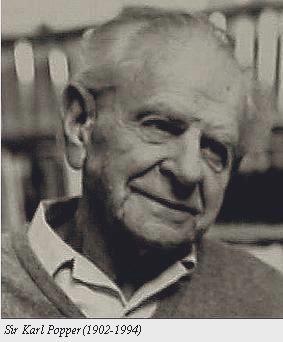
Karl Popper is generally regarded as one of the greatest philosophers of science of the 20th century. He was also a social and political philosopher of considerable stature, a self-professed ‘critical-rationalist’, a dedicated opponent of all forms of scepticism, conventionalism, and relativism in science and in human affairs generally, a committed advocate and staunch defender of the ‘Open Society’, and an implacable critic of totalitarianism in all of its forms. One of the many remarkable features of Popper's thought is the scope of his intellectual influence. In the modern technological and highly-specialised world scientists are rarely aware of the work of philosophers; it is virtually unprecedented to find them queuing up, as they have done in Popper's case, to testify to the enormously practical beneficial impact which that philosophical work has had upon their own. But notwithstanding the fact that he wrote on even the most technical matters with consummate clarity, the scope of Popper's work is such that it is commonplace by now to find that commentators tend to deal with the epistemological, scientific and social elements of his thought as if they were quite disparate and unconnected, and thus the fundamental unity of his philosophical vision and method has to a large degree been dissipated. Here we will try to trace the threads which interconnect the various elements of his philosophy, and which give it its fundamental unity.
Falsifiability or refutability is the logical possibility that an assertion could be shown false by a particular observation or physical experiment. That something is "falsifiable" does not mean it is false; rather, it means that if the statement were false, then its falsehood could be demonstrated.For example, "no human lives forever" is not falsifiable since it does not seem possible to prove wrong. In theory, one would have to observe a human living forever to falsify that claim. In contrast, "All humans live forever" is falsifiable: the presentation of just one dead human could prove the statement wrong. Importantly, we may never find a dead human if that claim is true, but regardless that claim is falsifiable because we can at least imagine a finding that would prove it wrong. Some statements are only falsifiable in theory, while others are even falsifiable in practice (i.e. testable). For example, "it will be raining here in one billion years" is theoretically falsifiable, but not practically so.Falsifiability, particularly testability, is an important concept in science and the philosophy of science. The concept was made popular by Karl Popper in his philosophical analysis of the scientific method. Popper concluded that a hypothesis, proposition, or theory is "scientific" only if it is, among other things, falsifiable. That is, falsifiability is a necessary (but not sufficient) criterion for scientific ideas. Popper asserted that unfalsifiable statements are non-scientific, although not without relevance. For example, meta-physical or religious propositions have cultural or spiritual meaning, and the ancient metaphysical and unfalsifiable idea of the existence of atoms has led to corresponding falsifiable modern theories. A falsifiable theory that has withstood severe scientific testing is said to be corroborated by past experience, though in Popper's view this is not equivalent with confirmation and does not guarantee that the theory is true or even partially true.Popper invented the notion of metaphysical research programs to name such ideas. In contrast to positivism, which held that statements are senseless if they cannot be verified or falsified, Popper claimed that falsifiability is merely a special case of the more general notion of criticizability. Still, he admitted that tests and refutation is one of the most effective methods by which theories can be criticized.
No comments:
Post a Comment